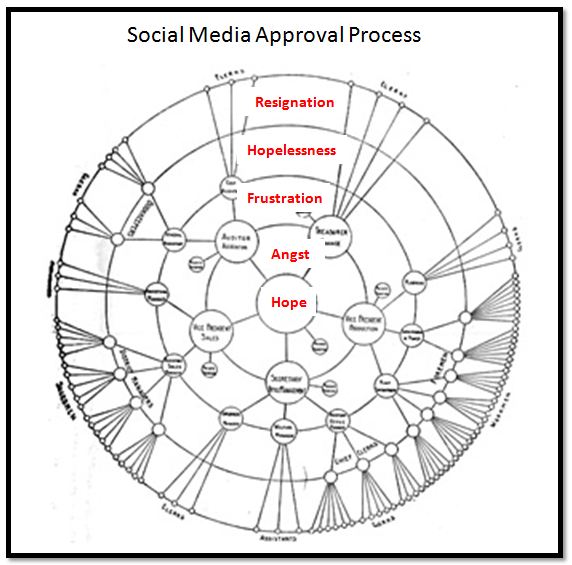A while back I was working with a new client in New York. In the lobby of their impressive building, there was a huge plaque with the corporate philosophies of the company’s founder — a man who had died 25 years ago. In every meeting I attended, his name, and his values, were mentioned at least once. As I learned about this company, it was apparent that this beloved man’s influence extended far beyond the grave into the daily activities of the company life today!
Corporate cultures are a complex amalgamation of executive personalities, external events, and history. Culture affects almost everything … from how employees are treated to how they compete in the marketplace. When I talk about social media strategies, inevitably the conversation turns to cultural fit.
Social media success and failure is not usually determined by resources, vision, or ability. It is inevitably a function of the personality of the organization. Here are five signs that your company culture may be getting in the way of your progress:
Corporate culture mis-match — You need to build your strategy around the realistic capabilities of your company culture. As grandma used to say, you have to deal with what is, not what you wish for. Is your company ready to become a publisher? Are they able to react? Are they truly open to the idea of customer dialogue? If the honest assessment is “no,” move on. That doesn’t mean you can’t be successful, you just have to adjust. Your culture is your culture. Your desire to have a blog isn’t going to change it. But your strategy can probably conform to your situation and still have an impact. You need to think about education, not execution.
Lack of executive sponsorship– On a related topic, if you’re counting on a “grassroots” effort to establish a company social media program that will “change the culture,” you’re setting yourself up for problems. To be successful in the long-term, you must have support from the top. Why? That’s who controls the purse strings and resources! That’s the person setting the strategy. You can’t make this happen alone. Here’s an article on selling your boss on social media that might be helpful.
Lack of executive engagement — To really build a social organization, you need your executives to be involved, as well as sponsoring the initiative. I’m not saying executives actually have to blog or tweet … but they have to be connected to the point that they intimately understand the vast implications and opportunities. Some executives will relish this change. Others will resist it. If your boss is in the second group, you need to lower your expectations and slow down.
Unwieldy politics. Every organization has politics. But when everybody is trying to own a piece of your blog or customer service strategy, watch out. If you find that Legal, HR and the janitorial staff demands to approve every tweet, it might be a sign that your company is just not built for social media. Remember, the beauty of the social web is an ability to be flexible and reactive. Most companies have been conditioned to broadcast. This is a very difficult change to make and it make take re-organization. One large brand I work with has re-invented its approach by creating a new department called Customer Connections. That’s the idea.
Unrealistic expectations — … and her brother “impatience.” It takes time to build a strategy and connect to customers, especially if cultural change has to occur first. It may take YEARS. If your boss is making your employment contingent on Facebook Likes or the number of blog comments you get next month, it might be time to consider another position!
One of my B2B customers is just getting into social media marketing after I have worked with them as their “rented Chief Marketing Officer” for more than two years! Why did it take so long? First, they had other low-hanging fruit to take care of (I’m a marketing consultant, not just a social media consultant!). And culturally, they just were not ready.
But a few months ago, the president approached me and said, “You know, I think we need to begin working on this social media stuff you talk about.” He was beginning to feel expectations from customers and suppliers and, along with a constant drip of education from me, there was a catalyst for change. The transformation is beginning, and we will be doing it the right way — with understanding, executive sponsorship, and cultural readiness … but it took me a long time to get them to that point.
Any of this sound familiar? What are your experiences with corporate culture and social media success and failure?



